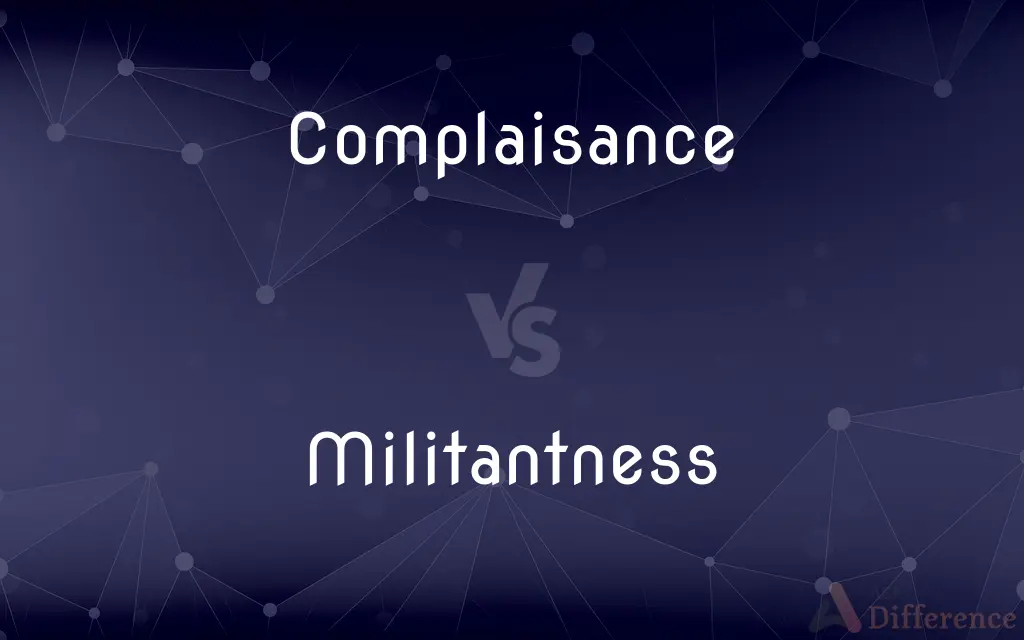Complaisance vs. Militantness — What's the Difference?
By Tayyaba Rehman — Published on October 4, 2023
"Complaisance" denotes a willingness to please others or a disposition to be agreeable, while "militantness" represents an aggressive, combative, and often zealous approach or stance, typically for a cause.

Difference Between Complaisance and Militantness
Table of Contents
ADVERTISEMENT
Key Differences
"Complaisance" and "militantness" embody diametrically opposite behaviors and attitudes. "Complaisance" illustrates a demeanor or attitude marked by a desire to please or accommodate others, often displaying agreeability, flexibility, and amiability. It reflects a disposition to acquiesce to others’ wishes or preferences, fostering harmony and cooperation. Conversely, "militantness" embodies a confrontational, aggressive, and often fervent approach or stance, especially in support of a cause or viewpoint. It indicates a readiness to fight, argue, or stand firmly for one’s beliefs or goals, even facing opposition or challenges.
While "complaisance" promotes harmony, goodwill, and congenial relationships by emphasizing accommodation and agreeableness, "militantness" may instigate conflict, contention, and struggle due to its combative and aggressive nature. "Complaisance" often involves subduing one’s own wishes, preferences, or viewpoints to maintain peace or to please others, valuing congeniality and accord. In stark contrast, "militantness" values assertiveness, resolution, and often confrontation, prioritizing the advancement or defense of a cause or belief over maintaining peace or appeasing others.
"Complaisance" typically generates a friendly, cooperative, and harmonious environment, with individuals displaying willingness to compromise or to go along with others’ wishes or decisions. This willingness to be agreeable and to accommodate often stems from a desire to maintain positive relationships and avoid conflict. On the other hand, "militantness" frequently leads to an atmosphere charged with determination, vigor, and often antagonism, with individuals displaying a strong, unwavering commitment to their cause or beliefs and a readiness to challenge or combat opposing viewpoints or obstacles.
"Complaisance" underscores the importance of cordiality, cooperation, and amicability in interactions, emphasizing the value of maintaining harmonious relationships and fostering goodwill. "Militantness," however, underscores the importance of steadfastness, aggressiveness, and sometimes zealotry in pursuing or defending one’s cause or beliefs, emphasizing the value of commitment, assertiveness, and, at times, confrontational tactics in achieving one’s objectives or in standing up for one’s principles.
Comparison Chart
Definition
Willingness to please or accommodate others
Aggressive, combative approach, typically for a cause
ADVERTISEMENT
Connotation
Positive, fostering harmony and cooperation
Negative, fostering confrontation and struggle
Behavioral Implication
Amiability, flexibility, and agreeability
Assertiveness, resolution, and combativeness
Relationship Dynamics
Fosters friendly, harmonious relationships
May instigate conflict and contention
Outcome
Promotion of peace, accord, and goodwill
Potential for struggle, antagonism, and fervor
Compare with Definitions
Complaisance
Complaisance refers to a disposition to be agreeable and to please others.
Her complaisance made her a favorite among her peers.
Militantness
Militantness denotes a fervent and unyielding stance in promoting one’s beliefs or goals.
The group's militantness in pursuing its objectives intimidated many.
Complaisance
Complaisance is the inclination to avoid disagreement and keep peace.
Her complaisance often led her to suppress her own needs and desires.
Militantness
Militantness implies a readiness to fight, argue, or resist for one's cause or viewpoint.
Her militantness in defending her principles earned her both respect and criticism.
Complaisance
Complaisance implies a demeanor that is amiable and obliging.
The employee's complaisance earned him popularity but cost him his individuality.
Militantness
Militantness represents a zealous and assertive pursuit of one’s objectives.
The organization’s militantness in promoting environmental conservation sparked many debates.
Complaisance
Complaisance denotes the willingness to conform or accommodate others' wishes.
His complaisance in following the group's decision maintained the harmony.
Militantness
Militantness signifies a strong commitment and resolve in advancing or defending a cause or belief.
His militantness was evident in his passionate speeches and relentless efforts.
Complaisance
Complaisance represents a cooperative and congenial attitude.
Their complaisance during the negotiations facilitated a swift agreement.
Militantness
Militantness refers to an aggressive and combative approach, usually for a cause.
His militantness in advocating for reforms led to many confrontations.
Complaisance
The inclination to comply willingly with the wishes of others; amiability.
Militantness
Militancy
Complaisance
The quality of being complaisant, amiable or agreeable.
Complaisance
Disposition to please or oblige; obliging compliance with the wishes of others; a deportment indicative of a desire to please; courtesy; civility.
These [ladies] . . . are by the just complaisance and gallantry of our nation the most powerful part of our people.
They strive with their own hearts and keep them down,In complaisance to all the fools in town.
Complaisance
A disposition or tendency to yield to the will of others
Common Curiosities
Can complaisance lead to avoiding conflict?
Yes, complaisance often involves avoiding conflict and maintaining harmony by accommodating others’ wishes.
Is militantness typically aggressive?
Yes, militantness typically involves an aggressive, combative, and often fervent approach or stance.
What does complaisance represent?
Complaisance represents a disposition to be agreeable and to please or accommodate others.
Does militantness imply a strong commitment to a cause?
Absolutely, militantness implies a strong, unwavering commitment to and aggressive advocacy for a cause or belief.
Can militantness lead to confrontation?
Yes, the aggressive and unwavering nature of militantness often leads to confrontations and conflicts.
Is complaisance considered a positive trait?
Complaisance is often considered positive as it fosters cooperation and harmony, but excessive complaisance may lead to suppression of one’s own needs or values.
Share Your Discovery

Previous Comparison
Motherly vs. Nurturing
Next Comparison
Witness vs. SpectatorAuthor Spotlight
Written by
Tayyaba RehmanTayyaba Rehman is a distinguished writer, currently serving as a primary contributor to askdifference.com. As a researcher in semantics and etymology, Tayyaba's passion for the complexity of languages and their distinctions has found a perfect home on the platform. Tayyaba delves into the intricacies of language, distinguishing between commonly confused words and phrases, thereby providing clarity for readers worldwide.














































